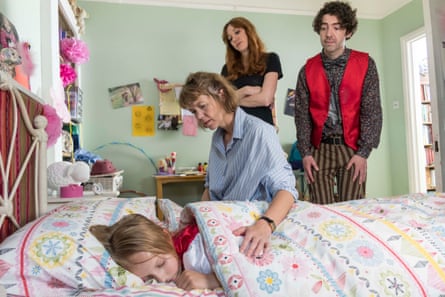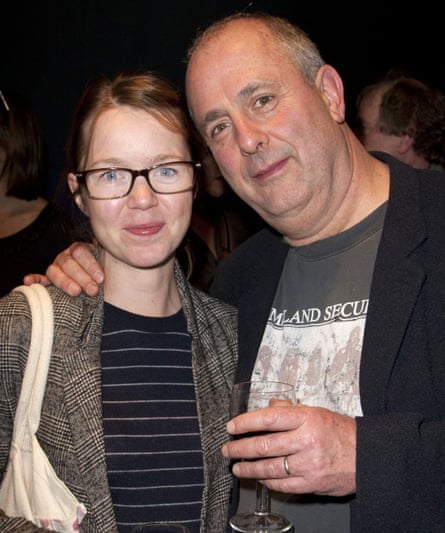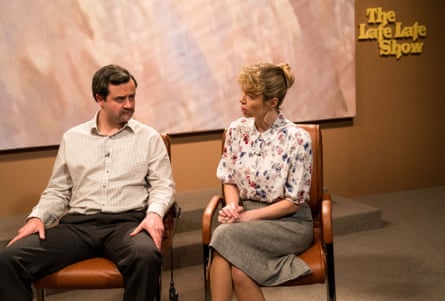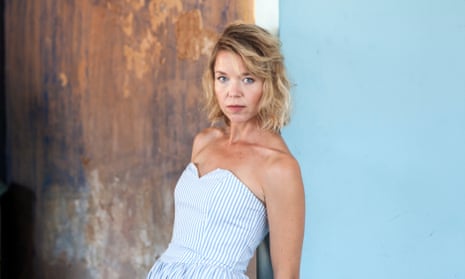Anna Maxwell Martin walks into the room, in the heatwave, sits down in a stripy blue dress that crumples all around her, and says she’s going to do this photoshoot in the nude. “Tits out, full frontal – this is it guys,” she says. “First time, this is it. Oh look,” she adds, brightening, as someone brings over a whirring fan, “I can have this for my sexy lady photoshoot, too.”
She’s joking, of course, because she’s not that sort of famous. But then, what sort of famous is she? She’s an actor whose name you might not know, but whose face you surely do, from many period dramas (she won the best actress Bafta for Bleak House in 2006) and, most recently, the starring role in the edgy, hysterical BBC2 comedy Motherland, in which she plays a reluctant mother who is always trying to get in with the comically awful parents of her children’s peers. The cult show has slipped into the vernacular: “It’s pure Motherland,” a certain kind of middle-class parent will now mutter as another micro-drama unfolds at the school gates. In casting, Sharon Horgan, the show’s writer, hoped for an actor “who made you laugh but also made you panic inside,” she says. “And Anna does that. She’s one of those actors who’s so naturally gifted she can just switch it on and off. She’s also a little bit nuts, which always helps.”
There will be a second and third series of Motherland, but Maxwell Martin doesn’t know when and is breezy about dates – as she seems to be about parenting itself, having grown up near Hull and not been too exposed to the precious yummy-mummy ideals of north London, where she now lives, and which the show lampoons. Rather like her character, she isn’t too bothered about the minutiae of education. She has two young daughters herself. “My nine-year-old didn’t do Sats because she’s dyslexic,” she says, “so they were really sweet about it, but she still seems to be tested all the time, which makes her feel shit – she’s nine! Dyslexic kids are often the loveliest kids – she’s adorable. As long as kids can make eye contact, chat, sit round a table and have a meal with adults – I don’t care about anything else. She says she wants to be a potter and travel around in a VW van with other artists and I say fine. You’re fine.”
I mention my own daughter, something that came up in her school report. “She’s six, darling!” she says, in a Yorkshire accent that seems to get stronger the longer we talk. “Who gives a shit? She shouldn’t even be at school!”

We are soon in much more serious territory, discussing a forthcoming BBC factual drama called Mother’s Day in which Anna plays Wendy Parry, the Englishwoman whose 12-year-old son was killed by the IRA in the Warrington bomb of 1993. (Do not confuse Motherland with Mother’s Day – they could not be more distinct.) I tell her that I was sent a link to watch a press preview online and, wrapped in a towel at 7am, only clicked on it to check that it worked. I was still sitting there in my towel 90 minutes later when it ended. It got me. She nods, as if this is to be expected.
“I haven’t felt this proud of a piece of work for… a long time,” she says, explaining that she can’t bear those TV dramas where we see so much “gratuitous snotting. In a different person’s hands they would have ramped up the whole Colin and Wendy thing, the husband and wife disagreeing about speaking to the press – that would’ve been a big row.” But because the director, Fergus O’Brien, comes from a 20-year background in making documentaries, “it means he doesn’t want to invent some big emotional drama. He says, ‘Just work with what you’ve got.’ And actually, it’s really positive in the end.”
There is such a lean economy to the drama that there is only one scene where we see her character overcome with emotion, falling on to a bed. “And that’s it. And I tried to cover my face so you didn’t see any of that.” I suddenly realise why that scene was so compelling: because it wasn’t entirely given to us. Such minimalism is perhaps not the way to the Oscars, but then does Maxwell Martin have those goals? She did try LA for a bit. “I went over, I didn’t really like it. I nearly got a really big movie – a Coen brothers film.” She says she believes in her work, “and I really have a lot of confidence in myself as an actor, but I don’t necessarily have that same confidence in a room full of people, networking at a party. If someone said, ‘Hey, do you want to come down to this really cool party?’ I would probably have said, ‘No, I have cystitis, sorry.’” A wry smile is never far from Maxwell Martin’s face.

“Then I got into a family situation very, very early. But again I just – maybe I don’t have enough ambition.” She is married to Roger Michell, who directed Notting Hill, and who had two children before they met. They now have two more children together. I start to say something about her fame and she interrupts me. “I don’t have fame – I’m not famous. I get, ‘Have I met you at playgroup?’ The other day I got,” she puts on a hoiked-bosom home counties accent, ‘Did I play mixed doubles with you at Binningdon tennis courts?’ And I went… ‘No.’ Because I can’t say,” she starts to stage whisper, “‘I’m actually an aac-tresss,’” and then cracks up laughing.
Does anybody ever say “Are you Anna Maxwell Martin?”
“No! Never. So no, I’m not famous and maybe that’s a good thing. The rule for me is, I will only work on something if a confirmed fun friend is already signed up to it. Who is the Confirmed Fun Friend? OK, I’ll do it.” She laughs. “I’m such a connoisseur, I so believe in the arts,” she says sarcastically, self-mockingly. “Why not? I’m really lucky to do a relatively easy job. I’m not a moaner, and so if I’m going to work, I have to have a good time.” But she quickly changes her tune when she remembers how fascinating she found Boy George on Who Do You Think You Are? “I’m so desperate to be famous enough to go on that programme. I’m literally desperate.” She becomes visibly excited, “I’m Inuit, and they’ve never had an Inuit on that.”
Maxwell Martin grew up in Beverley, in the East Riding of Yorkshire, and went to the local high school. Her mother was a research scientist and her father ran a pharmaceutical company. She started acting when she was a very young kid. “My parents were like, ‘Huh, who are you?’” But this was smalltown Yorkshire and there was no chance of getting on the telly. “I’d never even heard of youth theatre until I came down here. I would have loved to do that, never knew about it. I did go to a drama teacher in Beverley but really we did singing. We’d sing Whitney Houston songs dressed in crop tops. That was it.”
She used to get the bus into York with her friend Sal and eat a fat rascal at Bettys, do a bit of shopping, go home. Sal was boaty and wore pearls, “but I was a bit more Slaggy Bev,” she says. They used to sneak into nightclubs, somewhat unaware of how dangerous Hull was at the time, “but often I wouldn’t get in because I looked so young. We all had fake ID but my friends would laugh at me.”
That baby face came in handy, though, when she was 25 and played 12-year-old Lyra in His Dark Materials at the National Theatre – her big break. We discuss the joy of ageing (she’s 41), how there’s no point in lying about it.
“How hot is Jennifer Lopez? And she’s 49. And so I think she should be going round saying she’s 49,” she says.
Yeah but we don’t look like Jennifer Lopez.

“Do we not?” she asks. “For the record,” she adds, leaning over and speaking right into my Dictaphone, “I do.”
Before attending Lamda in London, Maxwell Martin went to Liverpool University to study history, where she made the group of female friends she has maintained for life, to add to her school friends, and with whom she cried when Geri left the Spice Girls, “but I can’t remember any of my degree. I really was just there to act and make friends and drink Bacardi Breezers. I think I did a lot on the First and Second World Wars, but Roger likes to quiz me about the dates at dinner parties because he knows I don’t know anything. He likes to show me up in a group situation… where I flounder,” she says drolly.
As for the current industry upheavals, I ask if she expected to live through the #MeToo movement in her lifetime. There is the longest silence. Then she says quietly, “I think I was really ignorant of what was happening. I have always been a really strong, forthright woman and never considered myself any less than a man, and that’s not out of arrogance. I think that’s just because I was brought up by two nice parents. So I just hadn’t experienced that. Or even if I was sort of lewdly commented on, I have a really good sense of humour and so I can always bat it back. Or even if I was touched up, I could just bat it back. So I didn’t really register the extent of the problem.”
She stresses that she is very glad the conversation is now open, “but I just want that slightly moany element taken out, where women are throwing into the pot all stories about sexual indecency and violent rape. Violent rape is very different from having your tits touched. It’s very, very different, and we don’t serve those women with any sense of justice if we lump all these things in together.”
About eight years ago she discovered pay inequality, while doing jobs “where I’d be number one on the call sheet and a man would be number three, but he would be on twice my wage. But even when I then raised it with my agent at the time, that was a no-no. Unequal pay seemed like a complete brick wall.” But again, she wasn’t born a luvvie and she can’t bear whining. “When you’re talking about being paid millions of dollars, you cannot moan about it. So let’s move it really quickly into women in all industries who are on zero-hours contracts, women who are exploited all the time in low-wage jobs – because I think we sound slightly like twats in our industry. We have a very charmed life, we get picked up in the morning, driven to work, someone brings us a cup of tea, ‘Where’s this?’, ‘Where’s that?’, ‘The air con’s not working’ – actors can behave very badly and become infantilised very quickly. I am in the loveliest job, I’m paid very well, and then I go home with a driver – I mean really,” she says. That last “really” is said in a tone that expresses full disapproval of the actors making 10 times more than her and complaining 10 times as loudly.
She isn’t even sure about pinning all the problems on men. “I’ve been bullied by other women in the industry – in fact more so than I have by men. Undermined, made to feel stupid, when there’s very clear favouritism in the room from a man. Most of the men I’ve worked with are good people who are totally respectful and lovely. There have been a handful who are bastards but also a handful of women who are bastards, too.” She actually calls them the C-word but says not to print it because her mother will be appalled, just like she was when Anna rang her the other day to read out a poem she had written for her friend’s 40th birthday, in which she called her friend an old C. “I like it,” replied her mother, “but I do not like that word.”
She has been filming the period drama David Copperfield, directed by Armando Iannucci, in the heatwave “and we’ve been wearing the full corset, then the layers of skirts, one of which is an actual duvet, outside, and it’s 100 degrees. You last five minutes then you rip it off – but oh my God it’s got a brilliant cast. Tilda Swinton’s in it, Dev Patel. He’s brilliant. Ben Whishaw. Daisy May Cooper – oh God I love her, she is just great. Hugh Laurie.”
I ask about the resounding popularity of period dramas and she says it is because they are comforting. “Anyone who has acted in a period drama will tell you that it’s the one thing you get people rushing up to you in the street to talk about, even a decade later. People love them – and we haven’t had a cracking one for ages.” This one will be different, though. “Armando has done his thing on it so it’s pretty out there, funny, different. He’s made it ageless and colour-blind – I hate that term, but it works. When you see Dev Patel playing David Copperfield he really is David Copperfield. He has a charm and an innocence about him and I think it’ll be a game-changer. In some ways, after doing Armando’s, I look back on those ones, the all-whitey ones, and I’m a bit like, ‘God, shit, that looks a bit embarrassing now.’ The ones I was in or the other ones, with all-white casts – that looks a bit dumb now. Because it just really didn’t have to be like that.”
She is playing a character in the film who’s a man in the book, Mr Strong, “but I’m playing him as Mrs Strong”.
So it’s not gender-blind either? You’re not playing a man?
“No – I would have loved to have done that. I could have dressed as a man. I would have loved that,” she replies.
Why – because it confounds gender expectations and frees you up to enter this whole other realm of acting that has been hitherto unavailable to you?
“No! Because I wouldn’t have had to wear the duvet.”
Mother’s Day will air in early September on BBC2
